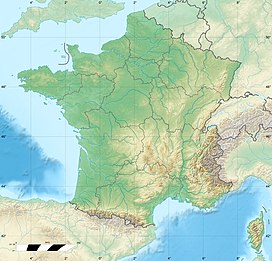Puy de Peyre-Arse
| Puy de Peyre-Arse | |
|---|---|
 The South face of Puy de Peyre-Arse. | |
| Highest point | |
| Elevation | 1,806 m (5,925 ft) |
| Coordinates | 45°06′36″N 2°42′39″E / 45.11000°N 2.71083°E |
| Geography | |
| Location | Cantal departement, France |
| Parent range | Mounts of Cantal (Massif Central) |
The Puy de Peyre-Arse is a peak in the volcanic massif of Cantal (Massif Central), separating the valleys of the Jordanne, Impradine, and Santoire. It reaches an altitude of 1,806 meters.
Toponymy
[edit]Pèira arsa means "burnt stone" in Auvergnat, the name evoking the rocky chaos and small cliffs that form the summit.[1]
Geography
[edit]Geology
[edit]The Peyre-Arse is formed by two trachyandesite flows dated at 7.8 million years ago, which form a "cliff" at the summit (visible in the photo). These flows overlay lahars composed of ash and pumice.[2]
Access
[edit]The easiest ascent route is the GR 4 to the west, which follows the ridge line between Puy Mary and Peyre-Arse. Access is also possible from the southeast (Col de Cabre), but the ascent is significantly more strenuous.[3]
In culture
[edit]
The painter Théodore Rousseau traveled to Cantal in 1830 and produced numerous studies, including that of the Saint-Vincent-de-Salers valley. The valley is crossed by the Mars River and is home to many villages. Puy Mary is at the center, with the small peak of Puy de Peyre-Arse to its left, and below the sharp peak to the right is the Col du Redondet.[4]
References
[edit]- ^ Buloz, François; Buloz, Charles; Brunetière, Ferdinand; Charmes, Francis; Doumic, René; Chaumeix, André (1914). Revue des deux mondes (in French). Au bureau de la Revue des deux mondes. p. 417.
- ^ Flauraud, Vincent (2011). La vallée de la Jordanne (in French). Lulu.com. p. 54. ISBN 978-2-9536058-5-3.
- ^ "Le Col de Cabre". www.cantalpassion.com (in French). Retrieved 2024-04-13.
- ^ "Théodore Rousseau | The Valley of Saint-Vincent | NG3296 | National Gallery, London". www.nationalgallery.org.uk. Retrieved 2024-04-13.


 French
French Deutsch
Deutsch